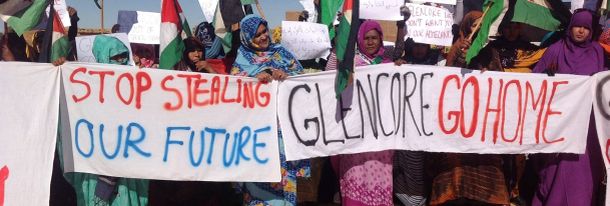
The biggest multinational company currently working for the Moroccan government in Western Sahara, Glencore PLC from Switzerland, is leaving its oil operations offshore Western Sahara.
"According to information from the company, Glencore has now withdrawn from Foum Ognit. According to Glencore, discussions are underway to withdraw from the second block, Boujdour Offshore Shallow", The Neue Zürcher Zeitung (NZZ) wrote today. NZZ is one of the biggest newspapers in Switzerland.
The two deals were originally signed with the Moroccan government - whose claims to Western Sahara are rejected by the UN and the international community.
Glencore used to hold a 18,75% interest in Foum Ognit, an oil exploration block offshore occupied Western Sahara. The website of the operator of the block, New Age, indicates that ownership is now transferred to the latter. As such, New Age today controls 75% of the block, while until recently it only controlled 56,25%.
The information about Glencore's exit from Foum Ognit has also been confirmed to Western Sahara Resource Watch (WSRW) by shareholders of the company. The move probably took place early May or late April. WSRW in February 2017 wrote that Glencore and New Age were undertaking seismic studies on Foum Ognit.
Glencore still remains, however, operator of the Boujdour Offshore Shallow, the neighbouring block to the north. According to the information that NZZ gathered from the company, and from what WSRW has understood from shareholders, Glencore is looking for a way out of this engagement on Boujdour Offshore Shallow.
Numerous international investors have raised the controversial Western Sahara licenses with the company, and many banks and pension funds have blacklisted Glencore over the matter over the course of the last year. Some of those are mentioned here. Here is for instance an 8-page-analysis from a Norwegian investor upon deciding to no longer invest in Glencore.
"We welcome the decision of Glencore. Signing agreements with the Moroccan government for oil exploration in Western Sahara is fundamentally unethical. Glencore's exit is a good contribution to the peace process. As long as Morocco can partner with foreign companies for oil search in the territory that it occupies, Morocco will not return to the UN negotiating table", Sylvia Valentin of Western Sahara Resource Watch stated.
Western Sahara has been under partial occupation by Morocco since 1975. On 21 December 2017, a judgement from the Court of Justice of the EU concluded that EU-Morocco trade deals cannot include Western Sahara without the specific consent of the people of the territory. In 2002, a UN Legal Opinion concluded in the same manner.
Morocco allocates land in occupied Western Sahara to green hydrogen investors
Morocco’s ambitions to become a global green hydrogen powerhouse are accelerating. Yet, Rabat is allocating land in a territory it does not legally own.
US eyes minerals in occupied Western Sahara
Seeking to position itself as a key supplier of strategic minerals for Western powers, Morocco has signed a new agreement with the United States that covers Western Sahara’s waters and the critical minerals harboured there.
TAQA-Moeve obtains land in occupied Western Sahara
Morocco’s push for green hydrogen has taken a decisive step forward - on territory it does not legally own.
EU-Morocco Statement: autonomy without self-determination, law without lawfulness
A joint statement that came out of last week’s EU-Morocco Association Council asks readers to believe in a fiction: that an undefined autonomy plan imposed by an occupying power can satisfy the right to self-determination, and that respect for international law can coexist with the systematic ignoring of the EU’s own highest court.



